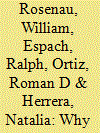|
|
|
Sort Order |
|
|
|
Items / Page
|
|
|
|
|
|
|
| Srl | Item |
| 1 |
ID:
085525


|
|
|
|
|
| Publication |
2008.
|
| Summary/Abstract |
Traditionally women and children have been seen as victims rather than protagonists in conflict. However, since the 1970s, women and children have assumed an active role as combatants in Colombian insurgencies. This is especially true of the FARC-EP, which integrates women into its political and military structure in ways that give them a sense of participation, accomplishment and satisfaction. Without their contributions, including sexual services, the FARC could probably not survive. However, despite their favourable experiences, many women ultimately become disillusioned with the FARC's masculine culture and value system that fails to accommodate their aspirations as women
|
|
|
|
|
|
|
|
|
|
|
|
|
|
|
|
| 2 |
ID:
132293


|
|
|
|
|
| Publication |
2014.
|
| Summary/Abstract |
For nearly ten years the Colombian government has systematically debriefed men and women who have left the Revolutionary Armed Forces of Colombia (FARC) and other violent extremist organizations. Today, the Colombian government maintains a database of more than 15,000 digitized interview transcripts-the largest of its kind in the world. With the proper enhancements and analysis, the database can provide critical insights into topics such as extremist recruitment, motivation, information operations, intelligence activities, leadership, and tactical and operational adaptation and innovation. Although Colombia's political violence is unique in many respects, further research using the database contributes to our understanding of the dynamics of insurgency in other regions. Ultimately, this research could enhance efforts to prevent recruitment into, and encourage current members to exit from violent non-state groups, such as gangs, terrorist groups, militias, and drug trafficking organizations.
|
|
|
|
|
|
|
|
|
|
|
|
|
|
|
|
|
|
|
|
|